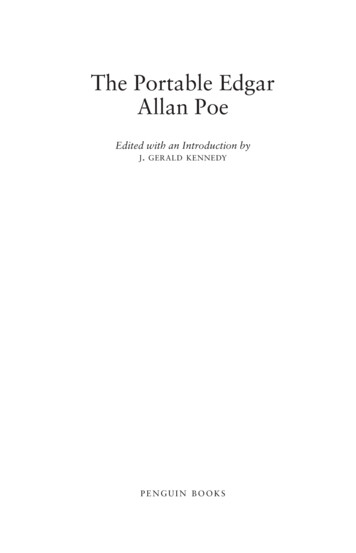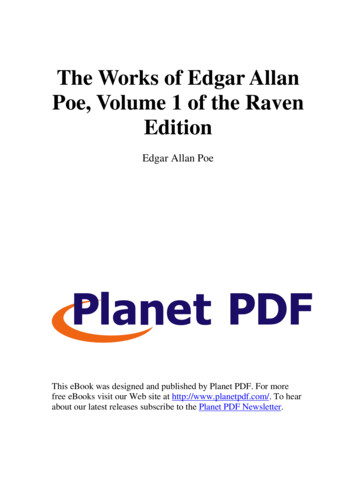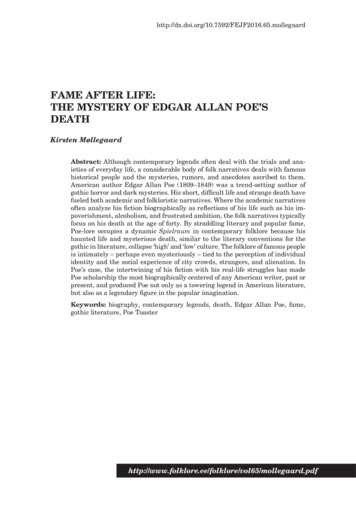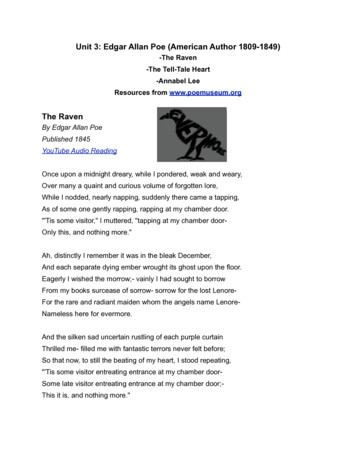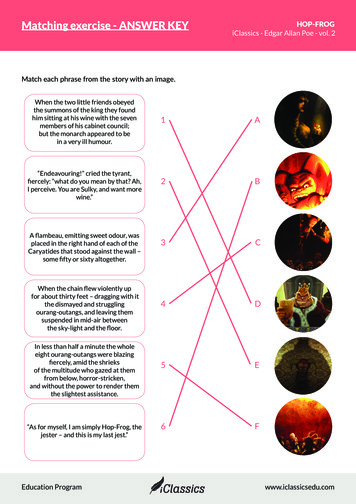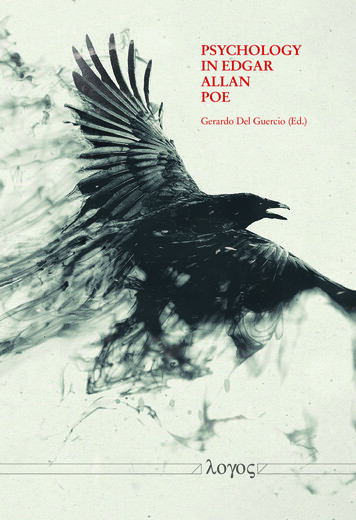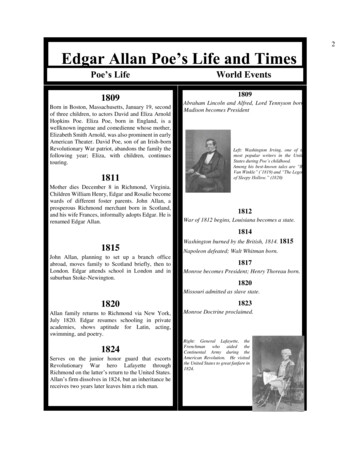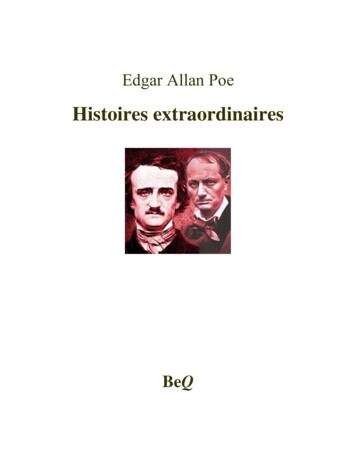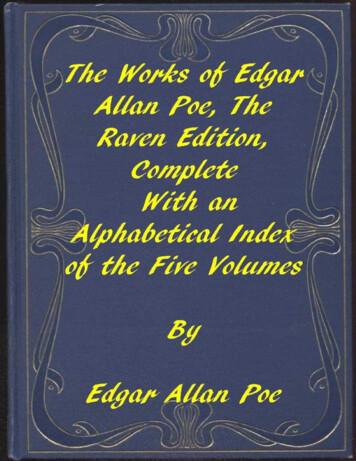
Transcription
The Project Gutenberg EBook of The Works of Edgar Allan Poe, The RavenEdition, by Edgar Allan PoeThis eBook is for the use of anyone anywhere at no cost and withalmost no restrictions whatsoever. You may copy it, give it away orre-use it under the terms of the Project Gutenberg License includedwith this eBook or online at www.gutenberg.orgTitle: The Works of Edgar Allan Poe, The Raven Edition, CompleteWith an Alphabetical Index of the Five VolumesAuthor: Edgar Allan PoeRelease Date: May 19, 2008 [EBook #25525]Last Updated: February 2, 2019Language: English*** START OF THIS PROJECT GUTENBERG EBOOK EDGAR ALLEN POE INDEX ***Produced by David WidgerTHE WORKS OF EDGAR ALLAN POETABLE OF CONTENTS AND INDEX OF THE FIVE VOLUMES
The Raven Edition
CONTENTS
INDEXCONTENTS
VOLUME 1EDGAR ALLAN POEDEATH OF EDGAR A. POETHE UNPARALLELED ADVENTURES OF ONE HANS PFAALTHE GOLD-BUGFOUR BEASTS IN ONE—THE HOMO-CAMELEOPARDTHE MURDERS IN THE RUE MORGUETHE MYSTERY OF MARIE ROGETTHE BALLOON-HOAXMS. FOUND IN A BOTTLETHE OVAL PORTRAIT
VOLUME 2THE PURLOINED LETTERTHE THOUSAND-AND-SECOND TALE OF SCHEHERAZADEA DESCENT INTO THE MAELSTR?M.VON KEMPELEN AND HIS DISCOVERYMESMERIC REVELATIONTHE FACTS IN THE CASE OF M. VALDEMARTHE BLACK CAT.THE FALL OF THE HOUSE OF USHERSILENCE—A FABLETHE MASQUE OF THE RED DEATH.THE CASK OF AMONTILLADO.THE IMP OF THE PERVERSETHE ISLAND OF THE FAYTHE ASSIGNATIONTHE PIT AND THE PENDULUMTHE PREMATURE BURIALTHE DOMAIN OF ARNHEIMLANDOR'S COTTAGEWILLIAM WILSONTHE TELL-TALE HEART.BERENICEELEONORA
VOLUME 3NARRATIVE OF A. GORDON PYMCHAPTER 1CHAPTER 14CHAPTER 2CHAPTER 15CHAPTER 3CHAPTER 16CHAPTER 4CHAPTER 17CHAPTER 5CHAPTER 18CHAPTER 6CHAPTER 19CHAPTER 7CHAPTER 20CHAPTER 8CHAPTER 21CHAPTER 9CHAPTER 22CHAPTER 10CHAPTER 23CHAPTER 11CHAPTER 24CHAPTER 12CHAPTER 25CHAPTER 13NotesLIGEIAMORELLAA TALE OF THE RAGGED MOUNTAINSTHE SPECTACLESKING PEST.THREE SUNDAYS IN A WEEK
VOLUME 4THE DEVIL IN THE BELFRYLIONIZINGX-ING A PARAGRAPHMETZENGERSTEINTHE SYSTEM OF DOCTOR TARR AND PROFESSOR FETHERHOW TO WRITE A BLACKWOOD ARTICLE.A PREDICAMENTMYSTIFICATIONDIDDLINGTHE ANGEL OF THE ODDMELLONTA TAUTATHE DUC DE L'OMELETTE.THE OBLONG BOX.LOSS OF BREATHTHE MAN THAT WAS USED UP.THE BUSINESS MANTHE LANDSCAPE GARDENMAELZEL'S CHESS-PLAYERTHE POWER OF WORDSTHE COLLOQUY OF MONOS AND UNATHE CONVERSATION OF EIROS AND CHARMIONSHADOW—A PARABLE
VOLUME 5PHILOSOPHY OF FURNITURE.A TALE OF JERUSALEMTHE SPHINXHOP-FROGTHE MAN OF THE CROWD.NEVER BET THE DEVIL YOUR HEADTHOU ART THE MANWHY THE LITTLE FRENCHMAN WEARS HIS HAND IN A SLINGSOME WORDS WITH A MUMMY.THE POETIC PRINCIPLEOLD ENGLISH POETRYPOEMSPREFACEPOEMS OF LATER LIFETHE RAVEN.THE BELLS.ULALUMETO HELENANNABEL LEE.A VALENTINE.AN ENIGMAFOR ANNIETO F——.TO FRANCES S. OSGOODELDORADO.
TO MARIE LOUISE (SHEW)TO MARIE LOUISE (SHEW)THE CITY IN THE SEA.THE SLEEPER.NOTESPOEMS OF MANHOODLENORETO ONE IN PARADISE.THE COLISEUM.THE HAUNTED PALACE.THE CONQUEROR WORM.SILENCEDREAM-LANDHYMNTO ZANTESCENES FROM "POLITIAN"POEMS OF YOUTHINTRODUCTION TO POEMS—1831LETTER TO MR. B—.SONNET—TO SCIENCEAL AARAAFTAMERLANETO HELENTHE VALLEY OF UNRESTISRAFELTO ——TO ——
TO THE RIVER——SONGSPIRITS OF THE DEADA DREAMROMANCEFAIRY-LANDTHE LAKE —— TO——EVENING STAR"THE HAPPIEST DAY."IMITATIONHYMN TO ARISTOGEITON AND HARMODIUSDREAMS"IN YOUTH I HAVE KNOWN ONE"NOTESDOUBTFUL POEMSALONETO ISADORETHE VILLAGE STREETTHE FOREST REVERIENOTESINDEX
PROSETHE ANGEL OF THE ODDTHE ASSIGNATIONHOW TO WRITE A BLACKWOOD ARTICLE.THE BUSINESS MANDEATH OF EDGAR A. POEEDGAR ALLAN POETHE BALLOON-HOAXTHE BLACK CAT.THE CASK OF AMONTILLADO.THE COLLOQUY OF MONOS AND UNATHE CONVERSATION OF EIROS AND CHARMIONTHE DOMAIN OF ARNHEIMTHE FACTS IN THE CASE OF M. VALDEMARFOUR BEASTS IN ONE—THE HOMO-CAMELEOPARDBERENICEA DESCENT INTO THE MAELSTR?M.THE DEVIL IN THE BELFRYDIDDLINGTHE DUC DE L'OMELETTE.ELEONORATHE FALL OF THE HOUSE OF USHERWHY THE LITTLE FRENCHMAN WEARS HIS HAND IN A SLINGTHE GOLD-BUGNARRATIVE OF A. GORDON PYMHOP-FROGTHE IMP OF THE PERVERSETHE ISLAND OF THE FAYA TALE OF JERUSALEMKING PEST.LANDOR'S COTTAGETHE LANDSCAPE GARDENLIGEIALIONIZINGLOSS OF BREATHMAELZEL'S CHESS-PLAYERTHE MAN OF THE CROWD.THE MAN THAT WAS USED UP.MS. FOUND IN A BOTTLETHE MASQUE OF THE RED DEATH.MELLONTA TAUTAMESMERIC REVELATIONMETZENGERSTEINMORELLA
THE MURDERS IN THE RUE MORGUETHE MYSTERY OF MARIE ROGETMYSTIFICATIONNEVER BET THE DEVIL YOUR HEADTHE OBLONG BOX.THE OVAL PORTRAITPHILOSOPHY OF FURNITURE.THE PIT AND THE PENDULUMTHE POWER OF WORDSA PREDICAMENTTHE PREMATURE BURIALTHE PURLOINED LETTERA TALE OF THE RAGGED MOUNTAINSSHADOW—A PARABLESILENCE—A FABLETHE SPECTACLESTHE SPHINXTHREE SUNDAYS IN A WEEKTHE SYSTEM OF DOCTOR TARR AND PROFESSOR FETHERTHE TELL-TALE HEART.THOU ART THE MANTHE THOUSAND-AND-SECOND TALE OF SCHEHERAZADETHE UNPARALLELED ADVENTURES OF ONE HANS PFAALVON KEMPELEN AND HIS DISCOVERYWILLIAM WILSONSOME WORDS WITH A MUMMY.X-ING A PARAGRAPH
POETRYTHE POETIC PRINCIPLEOLD ENGLISH POETRY PREFACEPOEMS OF LATER LIFEANNABEL LEE.FOR ANNIETHE BELLS.THE CITY IN THE SEA.ELDORADO.AN ENIGMATO F——.TO FRANCES S. OSGOODTO HELENTO MARIE LOUISE (SHEW)TO MARIE LOUISE (SHEW)THE RAVEN.THE SLEEPER.ULALUMEA VALENTINE.POEMS OF MANHOODTHE COLISEUM.THE CONQUEROR WORM.DREAM-LANDTHE HAUNTED PALACE.HYMNLENORETO ONE IN PARADISE.SCENES FROM "POLITIAN"SILENCETO ZANTEPOEMS OF YOUTHINTRODUCTION TO POEMS—1831LETTER TO MR. B—.AL AARAAFA DREAMDREAMSEVENING STAR
FAIRY-LAND"THE HAPPIEST DAY."TO HELENHYMN TO ARISTOGEITON AND HARMODIUSIMITATIONISRAFELTHE LAKE —— TO——SONGSONNET—TO SCIENCESPIRITS OF THE DEADTAMERLANETO ——TO ——TO THE RIVER——ROMANCETHE VALLEY OF UNREST"IN YOUTH I HAVE KNOWN ONE"DOUBTFUL POEMSALONETHE FOREST REVERIETO ISADORETHE VILLAGE STREET
THE WORKS OF EDGAR ALLAN POEIN FIVE VOLUMES
The Raven EditionCONTENTSEDGAR ALLAN POEDEATH OF EDGAR A. POETHE UNPARALLELED ADVENTURES OF ONE HANS PFAALLTHE GOLD-BUGFOUR BEASTS IN ONE—THE HOMO-CAMELEOPARDTHE MURDERS IN THE RUE MORGUETHE MYSTERY OF MARIE ROGET.(*1)THE BALLOON-HOAXMS. FOUND IN A BOTTLETHE OVAL PORTRAIT
EDGAR ALLAN POEAN APPRECIATIONCaught from some unhappy master whom unmerciful DisasterFollowed fast and followed faster till his songs one burden bore—Till the dirges of his Hope that melancholy burden boreOf “never—never more!”THIS stanza from “The Raven” was recommended by James Russell Lowell as an inscription uponthe Baltimore monument which marks the resting place of Edgar Allan Poe, the most interesting andoriginal figure in American letters. And, to signify that peculiar musical quality of Poe’s genius whichinthralls every reader, Mr. Lowell suggested this additional verse, from the “Haunted Palace”:And all with pearl and ruby glowingWas the fair palace door,Through which came flowing, flowing, flowing,And sparkling ever more,A troop of Echoes, whose sweet dutyWas but to sing,In voices of surpassing beauty,The wit and wisdom of their king.Born in poverty at Boston, January 19, 1809, dying under painful circumstances at Baltimore,October 7, 1849, his whole literary career of scarcely fifteen years a pitiful struggle for meresubsistence, his memory malignantly misrepresented by his earliest biographer, Griswold, howcompletely has truth at last routed falsehood and how magnificently has Poe come into his own. For“The Raven,” first published in 1845, and, within a few months, read, recited and parodied wherever theEnglish language was spoken, the half-starved poet received 10! Less than a year later his brother poet,N. P. Willis, issued this touching appeal to the admirers of genius on behalf of the neglected author, hisdying wife and her devoted mother, then living under very straitened circumstances in a little cottage atFordham, N. Y.:“Here is one of the finest scholars, one of the most original men of genius, and one of the mostindustrious of the literary profession of our country, whose temporary suspension of labor, from bodilyillness, drops him immediately to a level with the common objects of public charity. There is nointermediate stopping-place, no respectful shelter, where, with the delicacy due to genius and culture, hemight secure aid, till, with returning health, he would resume his labors, and his unmortified sense ofindependence.”And this was the tribute paid by the American public to the master who had given to it such tales ofconjuring charm, of witchery and mystery as “The Fall of the House of Usher” and “Ligeia”; suchfascinating hoaxes as “The Unparalleled Adventure of Hans Pfaall,” “MSS. Found in a Bottle,” “ADescent Into a Maelstrom” and “The Balloon-Hoax”; such tales of conscience as “William Wilson,”“The Black Cat” and “The Tell-tale Heart,” wherein the retributions of remorse are portrayed with anawful fidelity; such tales of natural beauty as “The Island of the Fay” and “The Domain of Arnheim”;such marvellous studies in ratiocination as the “Gold-bug,” “The Murders in the Rue Morgue,” “ThePurloined Letter” and “The Mystery of Marie Roget,” the latter, a recital of fact, demonstrating theauthor’s wonderful capability of correctly analyzing the mysteries of the human mind; such tales ofillusion and banter as “The Premature Burial” and “The System of Dr. Tarr and Professor Fether”; suchbits of extravaganza as “The Devil in the Belfry” and “The Angel of the Odd”; such tales of adventureas “The Narrative of Arthur Gordon Pym”; such papers of keen criticism and review as won for Poe theenthusiastic admiration of Charles Dickens, although they made him many enemies among the over-
puffed minor American writers so mercilessly exposed by him; such poems of beauty and melody as“The Bells,” “The Haunted Palace,” “Tamerlane,” “The City in the Sea” and “The Raven.” What delightfor the jaded senses of the reader is this enchanted domain of wonder-pieces! What an atmosphere ofbeauty, music, color! What resources of imagination, construction, analysis and absolute art! One mightalmost sympathize with Sarah Helen Whitman, who, confessing to a half faith in the old superstition ofthe significance of anagrams, found, in the transposed letters of Edgar Poe’s name, the words “a Godpeer.” His mind, she says, was indeed a “Haunted Palace,” echoing to the footfalls of angels anddemons.“No man,” Poe himself wrote, “has recorded, no man has dared to record, the wonders of his innerlife.”In these twentieth century days—of lavish recognition—artistic, popular and material—of genius,what rewards might not a Poe claim!Edgar’s father, a son of General David Poe, the American revolutionary patriot and friend ofLafayette, had married Mrs. Hopkins, an English actress, and, the match meeting with parentaldisapproval, had himself taken to the stage as a profession. Notwithstanding Mrs. Poe’s beauty andtalent the young couple had a sorry struggle for existence. When Edgar, at the age of two years, wasorphaned, the family was in the utmost destitution. Apparently the future poet was to be cast upon theworld homeless and friendless. But fate decreed that a few glimmers of sunshine were to illumine hislife, for the little fellow was adopted by John Allan, a wealthy merchant of Richmond, Va. A brotherand sister, the remaining children, were cared for by others.In his new home Edgar found all the luxury and advantages money could provide. He was petted,spoiled and shown off to strangers. In Mrs. Allan he found all the affection a childless wife couldbestow. Mr. Allan took much pride in the captivating, precocious lad. At the age of five the boy recited,with fine effect, passages of English poetry to the visitors at the Allan house.From his eighth to his thirteenth year he attended the Manor House school, at Stoke-Newington, asuburb of London. It was the Rev. Dr. Bransby, head of the school, whom Poe so quaintly portrayed in“William Wilson.” Returning to Richmond in 1820 Edgar was sent to the school of Professor Joseph H.Clarke. He proved an apt pupil. Years afterward Professor Clarke thus wrote:“While the other boys wrote mere mechanical verses, Poe wrote genuine poetry; the boy was a bornpoet. As a scholar he was ambitious to excel. He was remarkable for self-respect, without haughtiness.He had a sensitive and tender heart and would do anything for a friend. His nature was entirely freefrom selfishness.”At the age of seventeen Poe entered the University of Virginia at Charlottesville. He left thatinstitution after one session. Official records prove that he was not expelled. On the contrary, he gaineda creditable record as a student, although it is admitted that he contracted debts and had “anungovernable passion for card-playing.” These debts may have led to his quarrel with Mr. Allan whicheventually compelled him to make his own way in the world.Early in 1827 Poe made his first literary venture. He induced Calvin Thomas, a poor and youthfulprinter, to publish a small volume of his verses under the title “Tamerlane and Other Poems.” In 1829we find Poe in Baltimore with another manuscript volume of verses, which was soon published. Its titlewas “Al Aaraaf, Tamerlane and Other Poems.” Neither of these ventures seems to have attracted muchattention.Soon after Mrs. Allan’s death, which occurred in 1829, Poe, through the aid of Mr. Allan, securedadmission to the United States Military Academy at West Point. Any glamour which may have attachedto cadet life in Poe’s eyes was speedily lost, for discipline at West Point was never so severe nor were
the accommodations ever so poor. Poe’s bent was more and more toward literature. Life at the academydaily became increasingly distasteful. Soon he began to purposely neglect his studies and to disregardhis duties, his aim being to secure his dismissal from the United States service. In this he succeeded. OnMarch 7, 1831, Poe found himself free. Mr. Allan’s second marriage had thrown the lad on his ownresources. His literary career was to begin.Poe’s first genuine victory was won in 1833, when he was the successful competitor for a prize of 100 offered by a Baltimore periodical for the best prose story. “A MSS. Found in a Bottle” was thewinning tale. Poe had submitted six stories in a volume. “Our only difficulty,” says Mr. Latrobe, one ofthe judges, “was in selecting from the rich contents of the volume.”During the fifteen years of his literary life Poe was connected with various newspapers andmagazines in Richmond, Philadelphia and New York. He was faithful, punctual, industrious, thorough.N. P. Willis, who for some time employed Poe as critic and sub-editor on the “Evening Mirror,” wrotethus:“With the highest admiration for Poe’s genius, and a willingness to let it alone for more than ordinaryirregularity, we were led by common report to expect a very capricious attention to his duties, andoccasionally a scene of violence and difficulty. Time went on, however, and he was invariably punctualand industrious. We saw but one presentiment of the man-a quiet, patient, industrious and mostgentlemanly person.“We heard, from one who knew him well (what should be stated in all mention of his lamentableirregularities), that with a single glass of wine his whole nature was reversed, the demon becameuppermost, and, though none of the usual signs of intoxication were visible, his will was palpablyinsane. In this reversed character, we repeat, it was never our chance to meet him.”On September 22, 1835, Poe married his cousin, Virginia Clemm, in Baltimore. She had barelyturned thirteen years, Poe himself was but twenty-six. He then was a resident of Richmond and a regularcontributor to the “Southern Literary Messenger.” It was not until a year later that the bride and herwidowed mother followed him thither.Poe’s devotion to his child-wife was one of the most beautiful features of his life. Many of his famouspoetic productions were inspired by her beauty and charm. Consumption had marked her for its victim,and the constant efforts of husband and mother were to secure for her all the comfort and happinesstheir slender means permitted. Virginia died January 30, 1847, when but twenty-five years of age. Afriend of the family pictures the death-bed scene—mother and husband trying to impart warmth to herby chafing her hands and her feet, while her pet cat was suffered to nestle upon her bosom for the sakeof added warmth.These verses from “Annabel Lee,” written by Poe in 1849, the last year of his life, tell of his sorrowat the loss of his child-wife:I was a child and she was a child,In a kingdom by the sea;But we loved with a love that was more than love—I and my Annabel Lee;With a love that the winged seraphs of heavenCoveted her and me.And this was the reason that, long ago;In this kingdom by the sea.A wind blew out of a cloud, chillingMy beautiful Annabel Lee;So that her high-born kinsmen cameAnd bore her away from me,To shut her up in a sepulchreIn this kingdom by the sea,
Poe was connected at various times and in various capacities with the “Southern Literary Messenger”in Richmond, Va.; “Graham’s Magazine” and the “Gentleman’s Magazine” in Philadelphia; the“Evening Mirror,” the “Broadway Journal,” and “Godey’s Lady’s Book” in New York. EverywherePoe’s life was one of unremitting toil. No tales and poems were ever produced at a greater cost of brainand spirit.Poe’s initial salary with the “Southern Literary Messenger,” to which he contributed the first drafts ofa number of his best-known tales, was 10 a week! Two years later his salary was but 600 a year. Evenin 1844, when his literary reputation was established securely, he wrote to a friend expressing hispleasure because a magazine to which he was to contribute had agreed to pay him 20 monthly for twopages of criticism.Those were discouraging times in American literature, but Poe never lost faith. He was finally totriumph wherever pre-eminent talents win admirers. His genius has had no better description than in thisstanza from William Winter’s poem, read at the dedication exercises of the Actors’ Monument to Poe,May 4, 1885, in New York:He was the voice of beauty and of woe,Passion and mystery and the dread unknown;Pure as the mountains of perpetual snow,Cold as the icy winds that round them moan,Dark as the caves wherein earth’s thunders groan,Wild as the tempests of the upper sky,Sweet as the faint, far-off celestial tone of angelwhispers, fluttering from on high,And tender as love’s tear when youth and beauty die.In the two and a half score years that have elapsed since Poe’s death he has come fully into his own.For a while Griswold’s malignant misrepresentations colored the public estimate of Poe as man and aswriter. But, thanks to J. H. Ingram, W. F. Gill, Eugene Didier, Sarah Helen Whitman and others thesescandals have been dispelled and Poe is seen as he actually was-not as a man without failings, it is true,but as the finest and most original genius in American letters. As the years go on his fame increases. Hisworks have been translated into many foreign languages. His is a household name in France andEngland-in fact, the latter nation has often uttered the reproach that Poe’s own country has been slow toappreciate him. But that reproach, if it ever was warranted, certainly is untrue.W. H. R.
EDGAR ALLAN POEBy James Russell LowellTHE situation of American literature is anomalous. It has no centre, or, if it have, it is like that of thesphere of Hermes. It is divided into many systems, each revolving round its several suns, and oftenpresenting to the rest only the faint glimmer of a milk-and-water way. Our capital city, unlike London orParis, is not a great central heart from which life and vigor radiate to the extremities, but resemblesmore an isolated umbilicus stuck down as near as may be to the centre of the land, and seeming rather totell a legend of former usefulness than to serve any present need. Boston, New York, Philadelphia, eachhas its literature almost more distinct than those of the different dialects of Germany; and the YoungQueen of the West has also one of her own, of which some articulate rumor barely has reached usdwellers by the Atlantic.Perhaps there is no task more difficult than the just criticism of contemporary literature. It is evenmore grateful to give praise where it is needed than where it is deserved, and friendship so often seducesthe iron stylus of justice into a vague flourish, that she writes what seems rather like an epitaph than acriticism. Yet if praise be given as an alms, we could not drop so poisonous a one into any man’s hat.The critic’s ink may suffer equally from too large an infusion of nutgalls or of sugar. But it is easier tobe generous than to be just, and we might readily put faith in that fabulous direction to the hiding placeof truth, did we judge from the amount of water which we usually find mixed with it.Remarkable experiences are usually confined to the inner life of imaginative men, but Mr. Poe’sbiography displays a vicissitude and peculiarity of interest such as is rarely met with. The offspring of aromantic marriage, and left an orphan at an early age, he was adopted by Mr. Allan, a wealthyVirginian, whose barren marriage-bed seemed the warranty of a large estate to the young poet.Having received a classical education in England, he returned home and entered the University ofVirginia, where, after an extravagant course, followed by reformation at the last extremity, he wasgraduated with the highest honors of his class. Then came a boyish attempt to join the fortunes of theinsurgent Greeks, which ended at St. Petersburg, where he got into difficulties through want of apassport, from which he was rescued by the American consul and sent home. He now entered themilitary academy at West Point, from which he obtained a dismissal on hearing of the birth of a son tohis adopted father, by a second marriage, an event which cut off his expectations as an heir. The deathof Mr. Allan, in whose will his name was not mentioned, soon after relieved him of all doubt in thisregard, and he committed himself at once to authorship for a support. Previously to this, however, hehad published (in 1827) a small volume of poems, which soon ran through three editions, and excitedhigh expectations of its author’s future distinction in the minds of many competent judges.That no certain augury can be drawn from a poet’s earliest lispings there are instances enough toprove. Shakespeare’s first poems, though brimful of vigor and youth and picturesqueness, give but avery faint promise of the directness, condensation and overflowing moral of his maturer works. Perhaps,however, Shakespeare is hardly a case in point, his “Venus and Adonis” having been published, webelieve, in his twenty-sixth year. Milton’s Latin verses show tenderness, a fine eye for nature, and adelicate appreciation of classic models, but give no hint of the author of a new style in poetry. Pope’syouthful pieces have all the sing-song, wholly unrelieved by the glittering malignity and eloquentirreligion of his later productions. Collins’ callow namby-pamby died and gave no sign of the vigorousand original genius which he afterward displayed. We have never thought that the world lost more in the
“marvellous boy,” Chatterton, than a very ingenious imitator of obscure and antiquated dulness. Wherehe becomes original (as it is called), the interest of ingenuity ceases and he becomes stupid. KirkeWhite’s promises were indorsed by the respectable name of Mr. Southey, but surely with no authorityfrom Apollo. They have the merit of a traditional piety, which to our mind, if uttered at all, had beenless objectionable in the retired closet of a diary, and in the sober raiment of prose. They do not clutchhold of the memory with the drowning pertinacity of Watts; neither have they the interest of hisoccasional simple, lucky beauty. Burns having fortunately been rescued by his humble station from thecontaminating society of the “Best models,” wrote well and naturally from the first. Had he beenunfortunate enough to have had an educated taste, we should have had a series of poems from which, asfrom his letters, we could sift here and there a kernel from the mass of chaff. Coleridge’s youthfulefforts give no promise whatever of that poetical genius which produced at once the wildest, tenderest,most original and most purely imaginative poems of modern times. Byron’s “Hours of Idleness” wouldnever find a reader except from an intrepid and indefatigable curiosity. In Wordsworth’s first preludingsthere is but a dim foreboding of the creator of an era. From Southey’s early poems, a safer augury mighthave been drawn. They show the patient investigator, the close student of history, and the unweariedexplorer of the beauties of predecessors, but they give no assurances of a man who should add aught tostock of household words, or to the rarer and more sacred delights of the fireside or the arbor. Theearliest specimens of Shelley’s poetic mind already, also, give tokens of that ethereal sublimation inwhich the spirit seems to soar above the regions of words, but leaves its body, the verse, to beentombed, without hope of resurrection, in a mass of them. Cowley is generally instanced as a wonderof precocity. But his early insipidities show only a capacity for rhyming and for the metricalarrangement of certain conventional combinations of words, a capacity wholly dependent on a delicatephysical organization, and an unhappy memory. An early poem is only remarkable when it displays aneffort of reason, and the rudest verses in which we can trace some conception of the ends of poetry, areworth all the miracles of smooth juvenile versification. A school-boy, one would say, might acquire theregular see-saw of Pope merely by an association with the motion of the play-ground tilt.Mr. Poe’s early productions show that he could see through the verse to the spirit beneath, and that healready had a feeling that all the life and grace of the one must depend on and be modulated by the willof the other. We call them the most remarkable boyish poems that we have ever read. We know of nonethat can compare with them for maturity of purpose, and a nice understanding of the effects of languageand metre. Such pieces are only valuable when they display what we can only express by thecontradictory phrase of innate experience. We copy one of the shorter poems, written when the authorwas only fourteen. There is a little dimness in the filling up, but the grace and symmetry of the outlineare such as few poets ever attain. There is a smack of ambrosia about it.TO HELENHelen, thy beauty is to meLike those Nicean barks of yore,That gently, o’er a perfumed sea,The weary, way-worn wanderer boreTo his own native shore.On desperate seas long wont to roam,Thy hyacinth hair, thy classic face,Thy Naiad airs have brought me homeTo the glory that was GreeceAnd the grandeur that was Rome.Lo! in yon brilliant window-nicheHow statue-like I see thee stand!The agate lamp within thy hand,Ah! Psyche, from the regions whichAre Holy Land!It is the tendency of the young poet that impresses us. Here is no “withering scorn,” no heart
“blighted” ere it has safely got into its teens, none of the drawing-room sansculottism which Byron hadbrought into vogue. All is limpid and serene, with a pleasant dash of the Greek Helicon in it. Themelody of the whole, too, is remarkable. It is not of that kind which can be demonstrated arithmeticallyupon the tips of the fingers. It is of that finer sort which the inner ear alone can estimate. It seemssimple, like a Greek column, because of its perfection. In a poem named “Ligeia,” under which title heintended to personify the music of nature, our boy-poet gives us the following exquisite picture:Ligeia! Ligeia!My beautiful one,Whose harshest ideaWill to melody run,Say, is it thy will,On the breezes to toss,Or, capriciously still,Like the lone albatross,Incumbent on night,As she on the air,To keep watch with delightOn the harmony there?John Neal, himself a man of genius, and whose lyre has been too long capriciously silent, appreciatedthe high merit of these and similar passages, and drew a proud horoscope for their author.Mr. Poe had that indescribable something which men have agreed to call genius. No man could evertell us precisely what it is, and yet there is none who is not inevitably aware of its presence and itspower. Let talent writhe and contort itself as it may, it has no such magnetism. Larger of bone and sinewit may be, but the wings are wanting. Talent sticks fast to earth, and its most perfect works have still onefoot of clay. Genius claims kindred with the very workings of Nature herself, so that a sunset shall seemlike a quotation from Dante, and if Shakespeare be read in the very presence of the sea itself, his versesshall but seem nobler for the sublime criticism of ocean. Talent may make friends for itself, but onlygenius can give to its creations the divine power of winning love and veneration. Enthusiasm cannotcling to what itself is unenthusiastic, nor will he ever have disciples who has not himself impulsive zealenough to be a disciple. Great wits are allied to madness only inasmuch as they are possessed andcarried away by their demon, while talent keeps him, as Paracelsus did, securely prisoned in thepommel of his sword. To the eye of genius, the veil of the spiritual world is ever rent asunder that it mayperceive the ministers of good and evil who throng continually around it. No man of mere talent everflung his inkstand at the devil.When we say that Mr. Poe had genius, we do not mean to say that he has produced evidence of thehighest. But to say that he possesses it at all is to say that he needs only zeal, industry, and a reverencefor the trust reposed in him, to achieve the proudest triumphs and the greenest laurels. If we may believethe Longinuses and Aristotles of our newspapers, we have quite too many geniuses of the loftiest orderto render a place among them at all desirable, whether for its hardness of attainment o
The Project Gutenberg EBook of The Works of Edgar Allan Poe, The Raven Edition, by Edgar Allan Poe This eBook is for the use of anyone anywhere at no cost and with almost no restrictions whatsoever. You may copy it, give it away or re-use it under the terms of the Project Gutenberg Licens
